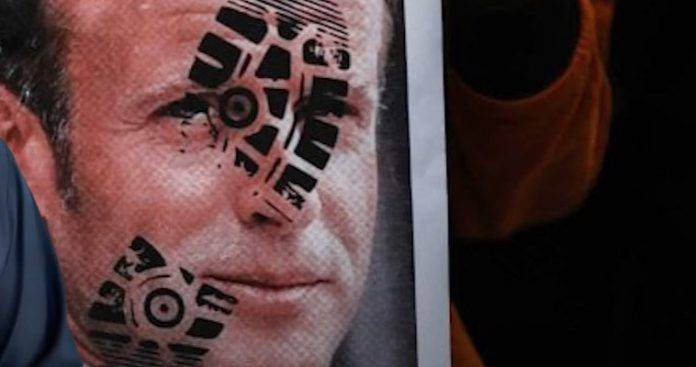Giorgos Lykokapis: Erdogan attacks Macron under the banner of Islam and using boycott as a tool
27/10/2020
“Just as they say do not buy Turkish products, I urge all my citizens not to buy French products,” was the characteristic statement by President Erdogan, who called for a boycott of French products in retaliation for the lighting of government buildings with controversial Charlie Hebo sketches satirizing the Prophet Muhammad.
The interesting thing about Erdogan’s statement is that for the first time he refers publicly to the boycott of Turkish products launched by a number of Arab countries, mainly Saudi Arabia, but avoided naming it. Boycott, which in the case of Saudi Arabia takes on the dimensions of a trade war, as the shelves of the kingdom’s supermarkets are empty of Turkish products, while #boycotTurkey dominates social media.
As the slightest portrayal of Mohammed is considered a blasphemy to the Muslim world as a whole, Paris’ decision to incite Muslims was expected, with Erdogan raising his voice dangerously, even launching personal insults against the French president, who he called a “psychopath” and a “Nazi”.
The Turkish president had tried to “woo” his French counterpart, during their telephone conversation they had at the end of last September, as he had appeared willing to even buy Rafale fighters. It was an attempt by Erdogan to “break the ice” in his strained relations with Paris, as the French president was the only European leader to strongly condemn the crescendo of Turkish provocations in the Eastern Mediterranean.
The boycott is limited
Eventually, in the face of any French-Turkish channels of communication, the Macron-Erdogan confrontation takes on a broader cultural dimension, with the French president appearing to oppose the principles of the Enlightenment and freedom of speech, while Erdogan attempts to act as the guardian of the “sanctuaries and saints” of the Islamic faith.
However, France’s largest employers’ union, Medef, sided with Macron, urging French companies to put the “values of democracy” above their financial interests. Its leader ruled out any financial countermeasures, saying “we do not respond to stupidity with stupidity”, noting that the boycott has a “limited scope”.
It is indeed worth noting that, at least for the time being, we do not see a generalized boycott of French products in the Arab world, nor any massive “outburst of anger” against France. Protests in the Gaza Strip and Tunisia were likely to be expected due to the influence of (pro-Turkish) political Islamist organizations. The withdrawal of French products from Qatari supermarkets was also to be expected, as were the harsh rhetorical reactions of Pakistan, two countries that are also firm allies of Turkey.
The announcement of the Jordanian Ministry of Foreign Affairs was harsh, where the anger against France is also overflowing with many stores withdrawing French products. But Jordan’s stance should not come as a surprise either, as the Hashemite monarchy often adopts the agenda of Islamic organizations, the “extreme minority” hich according to the French Foreign Ministry it is this minority that organizes as boycott campaigns.
Moderate stance from Iran and Saudi Arabia
In the case of Saudi Arabia and Egypt, the authorities are rather restrained, although at the level of public opinion there is anger against France, especially in Saudi Arabia. The attitude of these two countries is of paramount importance as they host the most emblematic reference sites of Sunni Islam, the birthplace of the Prophet Muhammad Mecca itself and Al Azhar University in Cairo, which is the main center of Sunni Islamic learning in the Arab world.
However, Iran’s stance is also restrained, with the Iranian Foreign Ministry criticizing Macron for “arming” ubiquitous Islamic extremists. At a time when Paris is reacting to the policy of “maximum pressure” against Iran pursued by the United States, Israel and Saudi Arabia, Iran will certainly not rush to take part in a boycott of French products. The one who is “leading” a boycott of French products is President Erdogan.
It is clear that Erdogan is instrumentalizing the religious sensitivities of Muslims for reasons of political hegemony, as he has done in the recent past with the Palestinians. With the restrained stance shown by the major Arab regimes on a fundamental issue of the Islamic faith, they are essentially “acknowledging” that their main source of concern remains Erdogan’s hegemonic ambitions, although certainly Macron’s action has put them in a difficult position.





